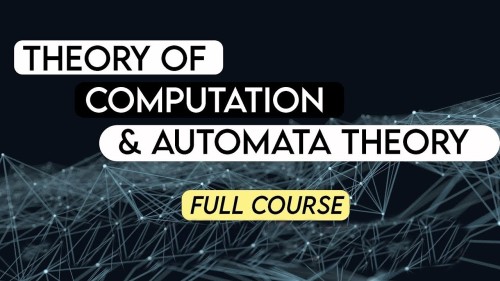
 |
Theory Of Computation: Automata Theory
 Theory Of Computation: Automata Theory Published 2/2025 Created by Munazza Khan MP4 | Video: h264, 1280x720 | Audio: AAC, 44.1 KHz, 2 Ch Level: All | Genre: eLearning | Language: English | Duration: 30 Lectures ( 2h 41m ) | Size: 902 MB Formal Language Foundations, Computational Complexity focus, Automata and Languages, Turing Machine and more. What you'll learn Deep understanding of how computer machines work based on a given design and what are the limitations of them. this course helps in developing strong problem solving skills, including analytical thinking, logical reasoning, and mathematical modeling. Understanding how parse and analyze code is crucial for building compilers. Till the end of the course you will be mastered in the topics like Finite Automata, DFA, NFA, Moore & Mealy machine, Turing machine and many more. Requirements Just the basic knowledge of Computers and its working and you are ready to take the course. Description This course explores the fundamental principles of computation, including formal languages, automata theory, computability, and complexity theory. Students will study finite automata, regular languages, context-free grammars, Turing machines, and the Church-Turing thesis. The course also introduces decidability and undecidability, computational complexity classes (P, NP, NP-complete), and reductions. Emphasis is placed on developing rigorous problem-solving skills and understanding the theoretical limits of computation.This course provides an in-depth study of abstract computing devices, including finite automata, pushdown automata, and Turing machines. Topics include regular languages, formal grammars, nondeterminism, and the Chomsky hierarchy. Students will explore the mathematical foundations of computation, analyze the power and limitations of different computational models, and apply automata theory to practical areas such as compiler design and pattern matching. The course emphasizes formal proofs, problem-solving techniques, and theoretical analysis of automata and formal languages.By the end of this course, you will develop strong logical thinking skills, enabling you to analyze problems rigorously, construct formal proofs, and reason about computational models systematically. You will learn to break down complex problems into structured components, recognize patterns in formal languages, and apply mathematical logic to verify the correctness of computational processes. These skills will enhance your ability to approach problem-solving with precision and clarity in both theoretical and practical computing contexts. Who this course is for Beginners who are developing a computer model, all the undergraduates pursuing Computer Science, electrical and CS engineering, and GATE students. Basic knowledge of discrete mathematics and formal logic is recommended. Homepage Код:
https://www.udemy.com/course/theory-of-computation-automata-theory-m/Цитата:
|
| Часовой пояс GMT +3, время: 22:45. |
vBulletin® Version 3.6.8.
Copyright ©2000 - 2025, Jelsoft Enterprises Ltd.
Перевод: zCarot